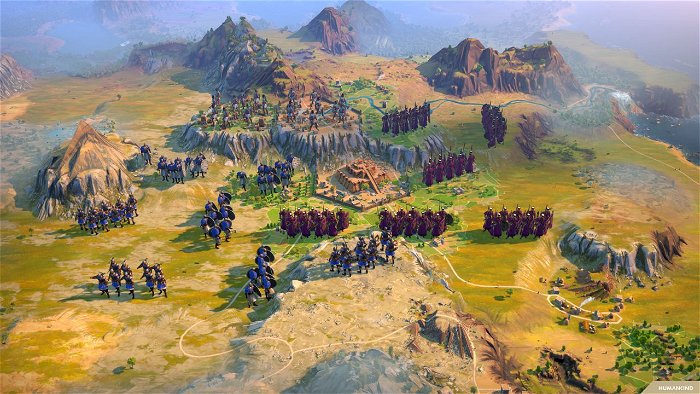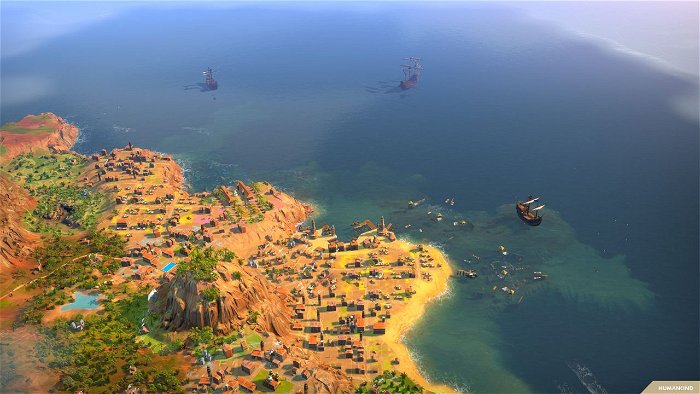I have a bit of a soft spot for history. I grew up feverishly devouring anything put out by The History Channel, back when it wasn’t suspiciously dominated by aliens and men surviving in various harsh outdoor conditions, and took far more history classes than necessary during my college years. Even today, one of my favourite podcasts deals solely with the rise and fall of the Roman Empire; I’m on my second listen through. So, when Amplitude Studios states that their mission with the upcoming 4X strategy game Humankind is to make the most historically accurate game of this type, my attention is well and truly piqued.

Now, my question about this mandate is really the basic “Well what does that mean,” question, and I don’t mean that sarcastically at all. 4X games are routinely set in ages long past, with the much lauded Civilization franchise being notable among them, but a lot of these experiences capitalize on the idea of rewriting history using the player’s keen mind and tactics. History, while rich and interesting, is already written, so watching the Gauls sack Rome won’t surprise anyone, but Carthage winning the space race might lead to some interesting game play mechanics and storytelling opportunities. That aside, I think I might understand what Amplitude Studios mean when they make their deep historical desires for Humankind known and it’s not a slavish retelling of real world events, but we’ll get to all that.
So, I got to spend some quality time with the current build of Humankind and a few things stuck out to me. First of all, upon starting the game I didn’t throw my lot in with some great civilization from humanity’s past with settlers eager to found a city that will one day be great. No, Humankind takes place over 6 different eras and in the starting era, the Neolithic era, your little tribe is simply a group of nomads with no real cultural definition and lacking the ability to even found a city at all (That comes in the second era). Your tribe wanders around the land mass looking for food and trying to understand the world around you until eventually the population of your little tribe grows and you must consider whether it would be best if you split up to cover more ground or remained in a stronger cluster.

Now, I know what sort of images come to mind when I mention a cluster of units in a 4X game, but that’s not really what we’re dealing with here. In older games of this genre a simple and easy solution to any combat encounters was what was affectionately known as the stack of doom: a group of units so vast that if they don’t win any combat encounter by force of arms they most definitely will from sheer attrition. That’s not what’s going on here. See, the way combat is resolved in Humankind is a bit more active and engaging than all of that. Both sides place any units in their stack on a small combat grid and duke it out in what feels like a light turn based strategy game. This is the same whether it is an invading army or an animal on the map that you hope to turn into yummy yummy food. It can be pretty easy to discount some of these encounters but there is certainly more to take into account than just army size. Terrain bonuses play a huge roll in these combats, which is likely why my first one ended with what was, at the time, my entire civilization being brought low by a spritely deer who happened to have the high ground. It was not a glorious day for me.
Combat is one of the many ways players can acquire that illusive and all important resource: fame. Humankind is largely a game that asks what sort of make the players will leave on the world and that is largely measured by fame. While other games might push players into a new era once they have researched some significant tech, in Humankind players are propelled forward through history by the weight of their great deeds, such as important discoveries, decisive victories, and all the like. Once players have left enough of their marks on the world they move onto the next era and pick from a list of cultures which they would like to emulate, giving appropriate bonuses for each. Important to note that this is not a one-time deal so it’s only a matter of how many more great things you accomplish before you can mold the essence of you culture even further as you enter future ages.

So, when Amplitude Studios says that Humankind will be a very historically accurate 4X game, I think I see what they mean. They aren’t saying that this will be an accurate retelling of history or even that your Hittites Empire will look anything at all like the actual Hittites did. What they are saying is that history is shaped by great deeds and those deeds are what propelled society forward and allowed us to understand our past from across the great seas of time and space, success was never written in stone for any great culture simply because of their lineage, and sometimes a bunch of dudes got absolutely wrecked by a deer on a hill.



